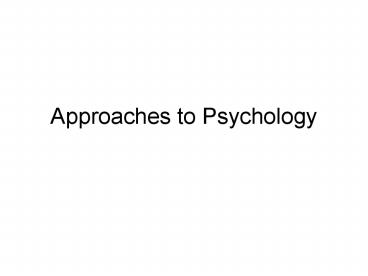Approaches to Psychology PowerPoint PPT Presentation
1 / 20
Title: Approaches to Psychology
1
Approaches to Psychology
2
Psychoanalytic Theory
- Sigmund Freud
- Psychoanalytic Model
- Structure of the mind
- Defense mechanisms
- Stages of early psychosexual development
3
Psychoanalytic Theory
- Structure of the mind
- Id
- Libido and Thanatos
- Operates according to the Pleasure Principle
- Processing Information Primary Process
- Emotional, irrational, illogical, fantasy-driven
4
Psychoanalytic Theory
- Structure of the mind
- Ego
- Part of mind that ensures we act realistically in
meeting our needs - Mediate conflict between id and superego
- Operates according to the reality principle
- Information Processing Secondary process
- Logic and reason
5
Psychoanalytic Theory
- Structure of the mind
- Superego
- Conscience
- Driven by moral principles
6
Psychoanalytic Theory
- 2. Defense Mechanisms
- Unconscious protective processes that keep
primitive emotions associated with conflicts in
check - Denial
- Displacement
- Projection
- Rationalization
- Reaction formation
- Repression
- Sublimation
7
Psychoanalytic Theory
- Psychosexual stages of development
- Oral
- Anal
- Phallic
- Latency
- Genital
8
Psychoanalytic Theory
- Later developments
- Anna Freud
- Ego Psychology
- Object Relations
- Carl Jung
- More optimistic, less sinister world view
9
Psychodynamic Approach
- Impulses, desires, motives determine human
behavior, conflicts that are intrapsychic are
out of awareness - Intrapsychic factors cause both normal abnormal
behaviors - Childhood sets down foundations for behavior
through satisfaction or frustration of basic
needs/impulses early relationships with family,
peers, and authority figures are given special
attention - Clinical assessment treatment should emphasize
intrapsychic activity if behavior is to be
understood and behavior problems are to be
alleviated
10
Other Psychodynamic Approaches
11
Pros/Cons of Psychodynamic Approach
- Basic concepts are too vague to be measured and
tested scientifically - Did not evolve out of research
- Its cultural diversity application
- Reliability and validity of psychodynamic
instruments - Focus on sex and aggression
- Focus on childhood
12
Behavioral Model
- Ivan Pavlov (1849-1936)
- Classical Conditioning
- UCS
- UCR
- Neutral Stimulus
- CS
- CR
13
Behavioral Model
- John Watson (1878-1958)
- Considered founder of behaviorism
- Little Albert
- Joseph Wolpe (1915- )
- Systematic Desensitization
14
Behavioral Model
- Operant Conditioning
- BF Skinner (1904-1990)
- Rather than assuming that behavior reflects ones
motives or needs - Examined the consequences of the behavior
15
Behavioral Approach
- Social Learning
- Albert Bandura
- Vicarious Cognitive Processes
- Bobo doll
- Self-efficacy
- Expectancies about what one can and cannot do in
a given situation
16
Behavioral Approach
- Aaron Beck
- Ones cognitive APPRAISALS of their own behavior
precede influence their emotional reaction to
events - These thoughts become so automatic that they
influence future emotional reactions without
conscious awareness
17
Pros/Cons of Behavioral Approach
- Overly reductionistic
- Might explain simple stimulus-response
relationships, but not adequately with more
complex, internal processes - Animal-laboratory based
18
Humanistic Theory
- Self-Actualization
- Underlying assumption
- we can reach our highest potential in all areas
of functioning - Number of conditions block our actualization
- Since every person is basically good whole,
most blocks originate outside the individual
19
Humanistic Theory
- Abraham Maslow (1908-1970)
- Hierarchy of needs
20
Humanistic Theory
- Carl Rogers (1902-1987)
- Originated person-centered therapy
- Unconditional positive regard
- Empathy
- Pros and Cons of Humanistic Theory

